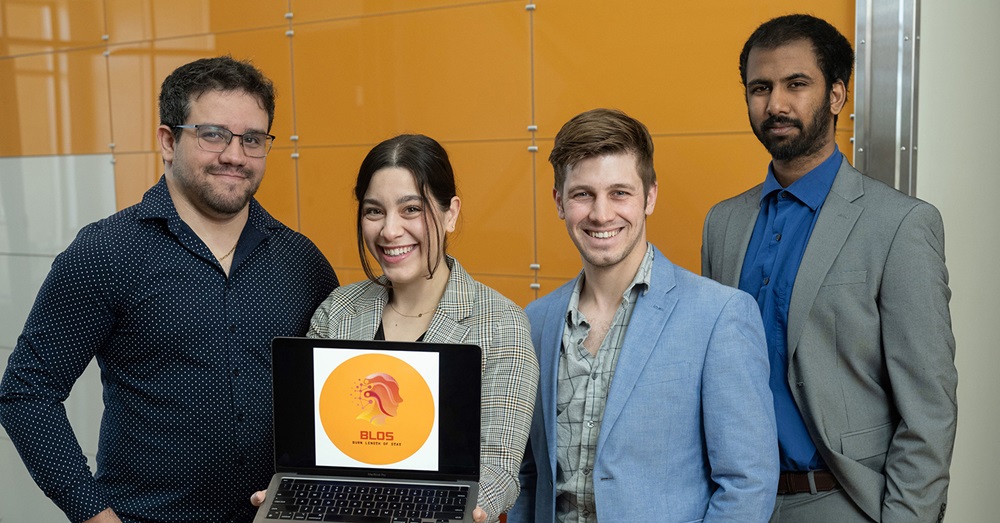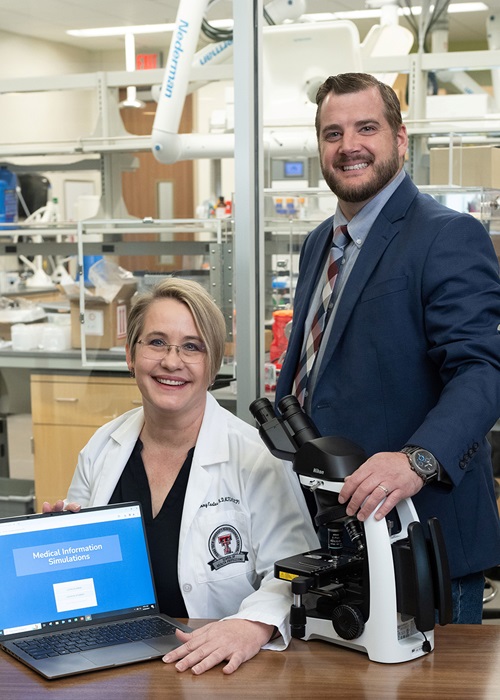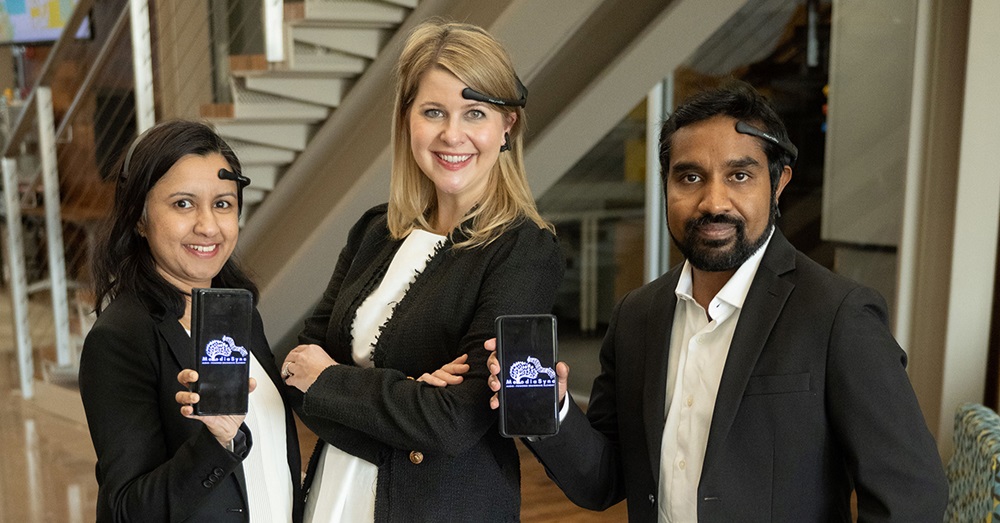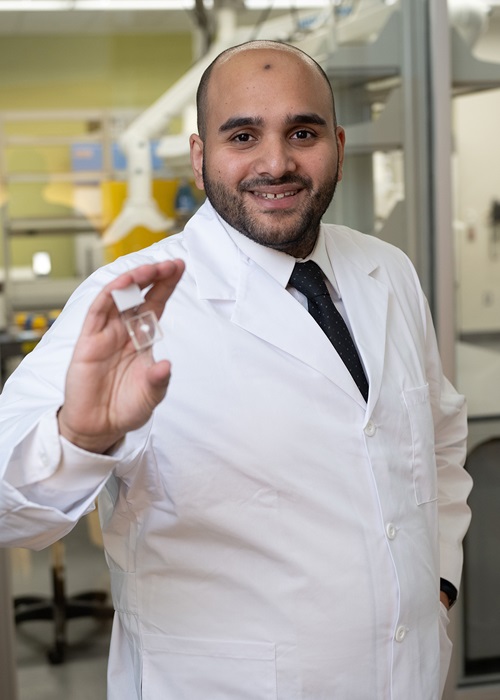TTUHSC Teams Excel in Innovation Hub’s 2024-2025 Texas Tech Accelerator Competition
Four teams representing the Texas Tech University Health Sciences Center (TTUHSC) flexed their entrepreneurial muscles and earned a place among the 14 startup teams selected for the 2024-2025 Accelerator Cohort during the Texas Tech Accelerator Competition April 5 at Buddy Holly Hall.
Each year the Texas Tech Innovation Hub at Research Park hosts the Texas Tech Accelerator Competition to encourage and support teams as they vie for a coveted spot in the Accelerator Program. The year-long program includes a $25,000 business startup grant sponsored by the Lubbock Economic Development Alliance. In addition, the Innovation Hub provides work space, a mentorship team and access to industry experts and investors to each startup team.
The 14 startups selected for the 2024-2025 Accelerator Program represent the Innovation Hub’s eighth and largest cohort. Five of the 14 start-up teams are developing AI, machine learning or advanced manufacturing technologies and will have access to the Industry Advancement Technology Accelerator Track, a new addition to the Accelerator Program that is funded by Texas Tech University alumni.
The TTUHSC startup teams that advanced to the 2024-2025 Accelerator Program include:

Burn Length of Stay
Burn Length of Stay, which seeks to revolutionize health care predictions utilizing machine learning technologies to predict hospital length of stay and prognosis to benefit physicians, patients, hospital administrators and insurance companies. Team members from the TTUHSC School of Medicine include Alan Pang, M.D., TTUHSC assistant professor of surgery, and medical students Jordan Kassab and Vishal Bandaru.
“The burn surgery world is historically understaffed, and the knowledge gap which exists within this small population of providers would be enhanced by having our product assist in more accurate prognostication of burn patients’ length of stay,” Pang said. “This will assist in allowing providers to gauge their own outcomes, which helps develop the efficacy of new therapeutics and helps hospitals and insurance companies to ensure appropriate charges and pay outs for interventions. Our product bridges the gap to create a more effective burn health care environment.”

Medical Information Simulations
Medical Information Simulations, which seeks to develop a web application Laboratory Information System (LIS) to provide career readiness and improve training for medical laboratory scientists in the laboratory information technology field. Team members include Tammy Carter, Ph.D., (associate professor) and Koy Kubala, Ph.D., (assistant professor) from the TTUHSC School of Health Professions Medical Laboratory Sciences program.
“We are developing a web-based simulator that will mimic basic LIS software, which serves as the interface between the pathology lab and providers,” Carter said. “LIS manages the lab test orders, test results and result analyses before being sent to the electronic medical record for providers. Due to software costs and hospital regulations, most laboratory/pathology students across the nation do not get exposed to this software until after they graduate and are hired. Inexperience with this software is leading to errors that have the potential to cause mistreatment and misdiagnoses of patients. Dr. Kubala and I are creating a web-based LIS simulator to properly train students on LIS software prior to entering the workforce.”

MelodiaSync
MelodiaSync, which is an innovative software that facilitates relaxation by providing real-time, personalized beat responses while listening to audio. Team members, all from TTUHSC, include Jessica Blume, Ph.D., assistant director of the Office of Global Health; Samudani Dhanasekara, M.D., Ph.D., research assistant professor in the Department of Surgery; and Chanaka Kahathuduwa, M.D., Ph.D., resident physician in the Department of Neurology and clinical assistant professor in the Department of Psychiatry.
“MelodiaSync is a new stress mis-management solution that users can access with an app on their phone, tablet or computer,” Blume said. “The app pairs with an EEG headset, which measures the user’s current brain state with a sensor. As the user listens to music or white noise, our technology works behind the scenes and adapts the audio to the user's brain state. Users get to choose whether they want to be relaxed, more focused, asleep or in a hypnotic trance. MelodiaSync then provides a customized listening experience to get them there. We’ve created MelodiaSync to help health care professionals and students — or anyone experiencing stress — to implement a feasible and reliable daily wellness routine.”

Neopurpose Therapeutics, Inc.
Neopurpose Therapeutics, Inc., which manufactures bio-printed tumor-on-chips that can be used for testing the safety and efficacy of potential anti-cancer drugs. Team members include Sanjay Srivastava, Ph.D., professor and chair in the Department of Immunotherapeutics and Biotechnology at the TTUHSC Jerry H. Hodge School of Pharmacy in Abilene, TTUHSC Graduate School of Biomedical Sciences students Shreyas Gaikwad and Mohamed Eltokhy and research associate Marina Curcic.
“At Neopurpose Therapeutics, we have developed bio-printed tumor-on-chip models for testing the efficacy of anti-cancer compounds,” Gaikwad said. “By harnessing the potential of 3D printing, we have created complex tumor models that mimic the in vivo tumor microenvironment. The FDA has recently passed the Modernization Act, which encourages the use of alternative models to animal testing. Due to this, these types of models will soon be a part of the drug discovery process. Using these models will help pharmaceutical companies evaluate the most efficient therapies at early stages, thus helping them save time and money. Apart from the drug discovery process, this technology also opens an avenue for precision medicine because custom models can be specifically produced for each cancer patient. Multiple drugs can then be tested on those models to choose the best therapy for the patient.”
The 2024-2025 Accelerator Program officially begins in May and runs through April 2025.
Related Stories
TTUHSC Cancer Researcher Honored by National Academy of Inventors
C. Patrick Reynolds, M.D., Ph.D., director of the School of Medicine Pediatric Cancer Research Center at TTUHSC, has dedicated his life as a researcher to developing treatments for childhood cancers.
TTUHSC’s Hudson Set to Serve as President for Society of Clinical Research Associates
The Society of Clinical Research Associates (SOCRA) has elected Texas Tech University Health Sciences Center’s (TTUHSC) Catherine Hudson, Dr.P.H., as its president for 2025-2026.
Clinical Research Institute a Source of Pride for Retiring Griswold
Upon his retirement, John Griswold, M.D., reflects on the Clinical Research Institute and what it has achieved.
Recent Stories
The John Wayne Cancer Foundation Surgical Oncology Fellowship Program at Texas Tech University Health Sciences Center Announced
TTUHSC is collaborating with the John Wayne Cancer Foundation and has established the Big Cure Endowment, which supports the university’s efforts to reduce cancer incidence and increase survivability of people in rural and underserved areas.
TTUHSC Receives $1 Million Gift from Amarillo National Bank to Expand and Enhance Pediatric Care in the Panhandle
TTUHSC School of Medicine leaders accepted a $1 million philanthropic gift from Amarillo National Bank on Tuesday (Feb. 10), marking a transformational investment in pediatric care for the Texas Panhandle.
Texas Tech University Health Sciences Center Permian Basin Announces Pediatric Residency Program Gift
TTUHSC Permian Basin, along with the Permian Strategic Partnership and the Scharbauer Foundation, Feb. 5 announced a gift that will fund a new pediatric residency.
